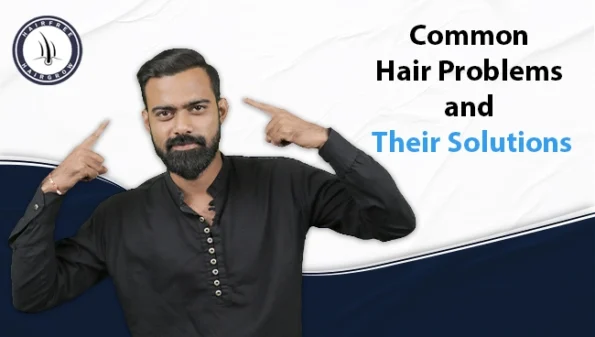Are you tired of dealing with frizzy, unmanageable hair? Or perhaps you’re struggling with excessive hair fall and dandruff? Don’t worry; you’re not alone. Many people face common hair problems that can be quite frustrating. The good news is that there are effective solutions available to help you overcome these issues and achieve healthier, more beautiful hair. In this article, we will explore some common hair problems people face and provide you with practical solutions to address them.
Hair problems can range from dryness and brittleness to scalp infections and thinning hair. Each problem requires a specific approach to restoring hair health and vitality. So, what are the common hair problems and their solutions? Let’s take a quick look.
General Hair Problems and Solutions
1. Hair Loss
Types of Hair Loss
There are different types of hair loss, such as male pattern baldness, female pattern baldness, and alopecia areata. Each type has its own unique characteristics and potential treatment options.
Causes of Hair Loss
Hair loss can be caused by hormonal imbalances, genetic predisposition, certain medications, underlying medical conditions, and excessive hairstyling practices. Identifying the root cause is essential for addressing the problem effectively.
Solutions for Hair Loss
Depending on the cause and severity of hair loss, various solutions are available. These may include medication, topical treatments, laser therapy, hair transplants, and lifestyle modifications. Consulting a healthcare professional or a trichologist can provide personalized recommendations.
2. Dandruff
Causes of Dandruff
Dandruff is often caused by an overgrowth of a fungus called Malassezia, which leads to scalp irritation and flaking. Other factors, such as dry skin, oily scalp, and sensitivity to haircare products, can also contribute to dandruff.
Home Remedies for Dandruff
There are several natural remedies for dandruff, including tea tree oil, apple cider vinegar, and aloe vera. These remedies can help reduce itchiness, flakes, and inflammation of the scalp.
Over-the-Counter Treatments
For more severe cases of dandruff, over-the-counter anti-dandruff shampoos containing active ingredients like pyrithione zinc, selenium sulfide, or ketoconazole can be effective. Following the instructions and using the product consistently is important for best results.
3. Frizzy Hair
Causes of Frizz
Frizz is often caused by dryness and lack of moisture in the hair. Humidity, excessive heat styling, and harsh haircare products can further contribute to frizz.
Tips to Prevent Frizz
To prevent frizz, it’s important to keep the hair moisturized and protected. Using a sulfate-free shampoo, applying a leave-in conditioner, avoiding excessive heat, and protecting the hair from humidity can help reduce frizz.
Haircare Products for Frizzy Hair
There are various haircare products specifically designed to tame frizz and provide long-lasting smoothness. Look for products containing ingredients like argan oil, shea butter, or keratin for maximum frizz control.
4. Split Ends
Causes of Split Ends
Split ends come when the protective outer layer of the hair cuticle is damaged, leading to the splitting of the hair shaft. Excessive heat styling, chemical treatments, and lack of regular trims are common causes of split ends.
Prevention and Treatment
Preventing split ends involves regular trims, minimizing heat styling, and using a heat protectant spray. Additionally, deep conditioning treatments, hair masks, and oils can help nourish and repair the damaged ends.
5. Oily Hair
Causes of Oily Hair
Overactive sebaceous glands can lead to excessive oil production on the scalp, resulting in oily hair. Hormonal imbalances, genetics, and certain haircare practices can contribute to oily hair.
How to Control Oily Hair
To control oily hair, it’s important to maintain a proper hair washing routine, avoid overwashing, and use lightweight, oil-free hair products. Dry shampoo can also help absorb excess oil between washes.
Best Shampoos for Oily Hair
Choosing the right shampoo is essential for managing oily hair. Look for clarifying or volumizing shampoos that are specifically formulated to control oiliness without drying out the scalp.
6. Dry and Damaged Hair
Common Causes of Dry and Damaged Hair
Dry and damaged hair can be caused by excessive heat styling, frequent coloring or bleaching, overexposure to the sun, and harsh haircare products. Environmental factors and lack of proper hydration also contribute to dryness.
Remedies for Dry and Damaged Hair
Restoring moisture and repairing damaged hair requires deep conditioning treatments, using a moisturizing shampoo and conditioner, avoiding excessive heat, and protecting the hair from the sun. Regular trims are also important to remove split ends.
Haircare Routine for Restoring Moisture
Creating a haircare routine that focuses on hydration is crucial for restoring moisture to dry and damaged hair. This may involve incorporating leave-in conditioners, hair masks, and serums into your routine for added nourishment.
7. Gray Hair
Why Does Hair Turn Gray?
Graying of hair is a natural process that occurs with age. The pigment-producing cells in the hair follicles gradually reduce their activity, leading to the loss of color.
Options for Covering Gray Hair
There are several options to cover gray hair, including permanent hair dyes, semi-permanent dyes, and henna. Choosing the right color and product that suits your preferences and hair type is important for a natural-looking result.
Embracing Your Gray Hair Gracefully
Alternatively, many individuals choose to embrace their gray hair and let it grow out naturally. Embracing your gray hair can be a liberating and empowering choice, allowing you to showcase your unique beauty.
8. Scalp Irritation
Causes of Scalp Irritation
Scalp irritation can be caused by various factors, including fungal or bacterial infections, allergic reactions, dermatitis, and excessive use of haircare products containing harsh chemicals.
Natural Remedies for Scalp Irritation
Natural remedies such as aloe vera gel, tea tree oil, and chamomile can help soothe scalp irritation. Maintaining good hygiene, avoiding irritants, and wearing breathable hats can also alleviate scalp discomfort.
Medical Treatments for Persistent Scalp Problems
If scalp irritation persists or worsens, it’s advisable to consult a dermatologist who can diagnose the underlying cause and recommend suitable medical treatments, such as medicated shampoos or topical medications.
9. Thin and Fine Hair
Causes of Thin and Fine Hair
Thin and fine hair can be a result of genetics, hormonal imbalances, aging, and improper hair care practices. Understanding the underlying cause can help in determining the appropriate solutions.
Hairstyling Tips for Adding Volume
Creating volume for thin and fine hair can be achieved through various hairstyling techniques, including using volumizing products, blow-drying with a round brush, and opting for layered haircuts that add dimension and movement.
Haircare Products for Thin and Fine Hair
Choosing the right haircare products specifically designed for thin and fine hair is crucial. Look for lightweight volumizing shampoos, conditioners, and styling products that provide lift and support without weighing the hair down.
10. Hair Breakage
Reasons for Hair Breakage
Hair breakage can occur due to excessive heat styling, chemical treatments, aggressive brushing or combing, and lack of proper care. Weak or damaged hair is more prone to breakage.
Preventing Hair Breakage
To prevent hair breakage, it’s important to minimize heat styling, use a wide-toothed comb or a brush with soft bristles, avoid harsh hair accessories, and protect the hair while sleeping by using a satin pillowcase or a silk hair wrap.
Nourishing Treatments for Brittle Hair
Nourishing treatments such as deep conditioning masks, hot oil treatments, and protein-based hair treatments can help strengthen and repair brittle hair. These treatments provide essential nutrients and moisture to promote healthy hair growth.
11. Baldness
Understanding Different Types of Baldness
Baldness can be classified into various types, including androgenetic alopecia (male or female pattern baldness), alopecia areata (patchy hair loss), and telogen effluvium (temporary hair shedding). Each type has its own unique characteristics and treatment approaches.
Hair Restoration Options
Hair restoration options for baldness include medications like minoxidil and finasteride, hair transplant procedures, and low-level laser therapy. The choice of treatment depends on the type and severity of baldness, as well as individual preferences.
Coping with Baldness
Coping with baldness is a personal journey, and there are various ways to embrace and feel confident with a bald or shaved head. These may include experimenting with different hairstyles, wearing headscarves or hats, or considering cosmetic options such as wigs or hairpieces.
Conclusion
In conclusion, experiencing hair problems is common, but they can be effectively addressed with the right knowledge and solutions. By understanding the causes and implementing appropriate remedies, you can overcome hair loss, dandruff, frizz, split ends, oily hair, dryness, gray hair, scalp irritation, thin and fine hair, hair breakage, and baldness. Remember to tailor your haircare routine to your specific needs and consult professionals when needed for personalized advice.
Frequently Asked Questions
Can stress cause hair problems?
Yes, prolonged stress can contribute to hair problems such as hair loss, thinning, and scalp issues. Managing stress through relaxation techniques and self-care practices can help mitigate its impact on hair health.
Are there any natural remedies for hair loss?
Natural remedies such as applying onion juice, coconut oil, or aloe vera gel to the scalp may help promote hair growth. However, it’s important to consult a healthcare professional for a proper diagnosis and guidance on treating hair loss.
How often should I wash my hair?
The frequency of hair washing depends on individual factors such as hair type, scalp condition, and lifestyle. Generally, washing your hair every two to three days is sufficient to maintain scalp health and prevent excessive dryness or oiliness.
Can diet affect the condition of my hair?
Yes, a balanced diet rich in vitamins, minerals, and protein is essential for healthy hair. Consuming foods like salmon, eggs, spinach, and nuts can provide the necessary nutrients for strong and vibrant hair.
Are heat styling tools damaging to hair?
Excessive use of heat styling tools like flat irons and curling irons can damage the hair cuticle, leading to dryness, breakage, and frizz. It’s advisable to minimize heat styling, use heat protectant products, and opt for lower heat settings when styling your hair.
Written By
MBBS, DDV
Dr. Sanjay Sharma combines years of experience with evidence-based approaches to tackle common hair issues, offering practical solutions for healthier, more resilient hair.
Disclaimer
We’ve made all possible efforts to ensure that the information provided here is accurate, up-to-date and complete, however, it should not be treated as a substitute for professional medical advice, diagnosis or treatment. See Detailed Disclaimers Here.


